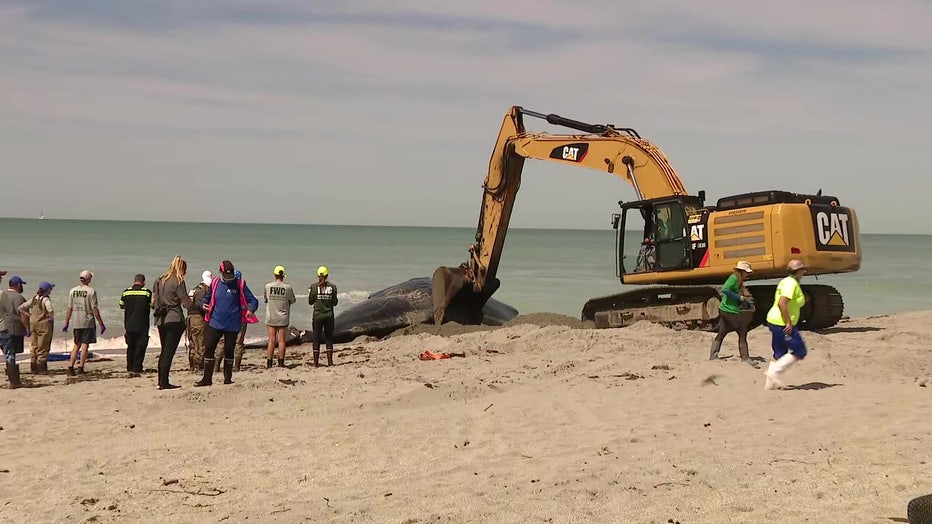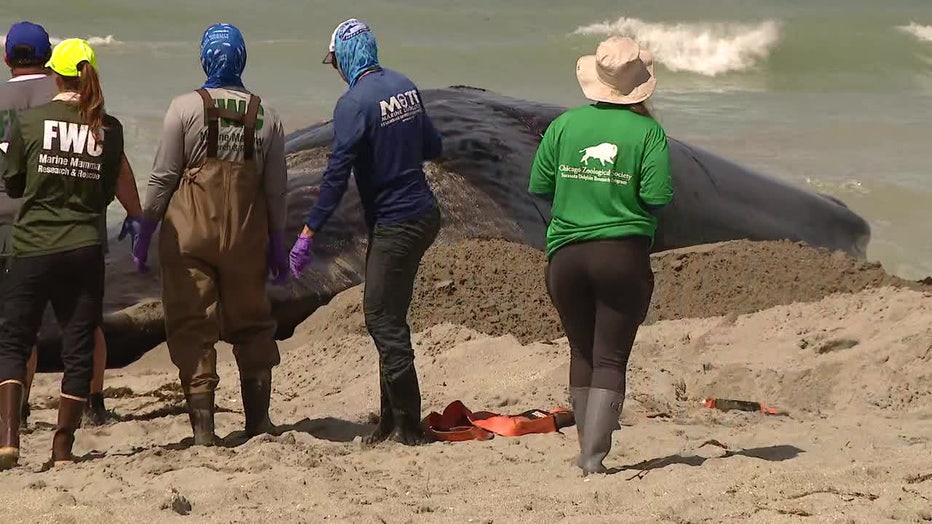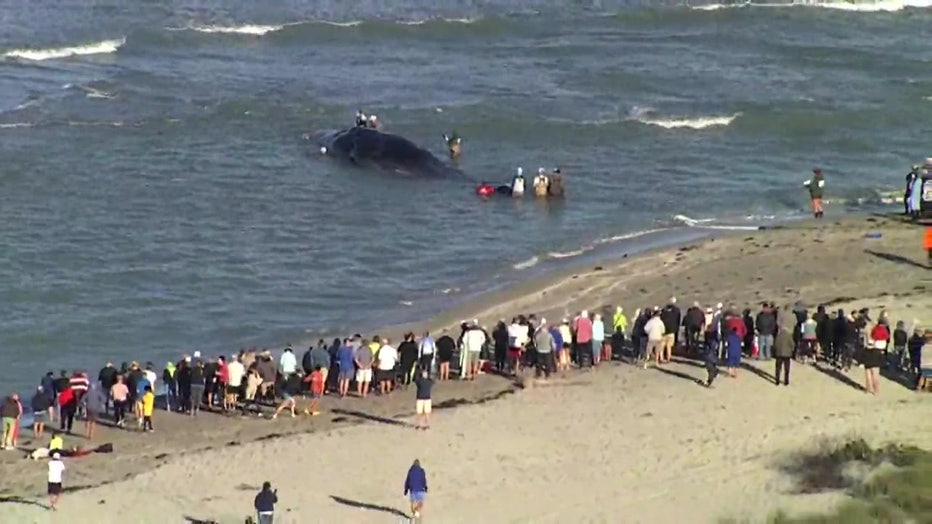Beached whale dies after stranding itself off Venice coast: ‘It’s heartbreaking'
Beached whale dies in Venice
A sperm whale that beached itself about 150 yards off Venice on Sunday has died and crews are working to figure out what happened. Kimberly Kuizon reports.
VENICE, Fla. - Officials are asking people to avoid Service Club Park beach in Venice after a sperm whale died after beaching itself on a sandbar about 150 yards offshore on Sunday.
Service Club Park in Venice will remain closed on Tuesday and a no swim advisory has been issued for beaches south of Venice Beach, including Service Club Park, Caspersen, and the Venice Fishing Pier beach that remains in effect.
The 70,000-pound whale was severely underweight and was struggling to stay alive on Sunday, according to FWC.
Officials say high, heavy surf hindered rescue efforts.
"It’s a gut punch," Gretchen Lovewell, Mote Marine Laboratory stranding investigations program manager stated. "You know, we get into this because we desperately love animals, but we have to put human safety first and when you have an animal this big thrashing in the surf, the kind of surf we had yesterday, it’s a gut punch. We want to help so badly. We sat out here all day yesterday waiting for that opportunity and, unfortunately, it never came."

After the necropsy, the whale will be taken about 10-15 miles offshore.
On Monday afternoon, crews began a necropsy, or an animal autopsy on the whale.
"We’re problem-solving as we go," Lovewell said.
READ: Whale that vanished from Atlantic over 200 years ago spotted off Massachusetts: 'Shouldn't exist'
She added that while they don’t know why the whale stranded itself, they do know that it is a 44-foot male and it is extremely skinny.
Beached whale press conference
Officials give an update after a beached whale died off the coast of Venice.
Lovewell went on to state that the necropsy will be done on the whale’s side, so they can get to the whale’s stomach. Crews worked to get it up on the beach to get samples, but crews couldn’t get it as far on the beach as they wanted, which has curtailed a bit of the sampling.
"Throughout that process, there will be a number of bodily fluids going out into the water, and we really want to encourage people to avoid the water. We are concerned about predations. So, for human safety, if people can avoid the water that would be great," Lovewell said.

Crews work to prepare the beached whale for a necropsy on Monday afternoon.
She said they are worried about sharks scavenging in the area, adding that once they get going, the scene will look very different, very soon.
After attaching a line to the animal, it cut deep into the tissue when crews tried to pull it up, and they were worried about the tail coming off, so they ended up pulling it up by its head. Then they used the sand to gently roll it over on its side.
READ: 5 orphaned manatees released into Florida spring after being nursed back to health
"We'll do a ton of measurements, we’ll do a bunch of external photographs and then we’ll actually start to go in systematically and do the necropsy.
Lovewell said they are looking at every system they can during a systematic dissection of the animal.
"We’ll look at every organ system we can get access to," Lovewell stated.

She stressed that they may not know what happened to the whale until test results come back in a few weeks.
Lovewell noted it has some worn teeth, which indicates that it is an older whale.
Sperm whales are an endangered species. Lovewell said they get about two whales a year along the entire Gulf Coast. She added that the last time a sperm whale was in Florida was in 2008.
READ: Florida manatees rebound to record-breaking winter numbers
"The fact that is was this close to shore and this skinny, tells us something has been going on for a while," Lovewell said.
She said crews will probably be on site all day on Monday and tomorrow morning. Lovewell noted that they would have to wait until tomorrow morning to tow the animal away due to the next high tide during daylight hours.

The sperm whale drew crowds, including Steve Hieronymus, to Service Club Park in Venice.
"It’s definitely bittersweet, it’s such a unique opportunity to see an incredible animal like this but to see it in this condition is sad," said Hieronymus.
Lovewell said, law enforcement officers will remain onsite throughout the night. She added that the excavator will also stay on the beach because crews will need the equipment on Tuesday to get the animal back into the water so Sea Tow can take it 10–15 miles offshore.
"Anytime we have animals that come in like this, especially when they are alive, and we can’t get to it and help it, it’s heartbreaking," Lovewell shared. "It’s a gut punch. We desperately wanted to get to it yesterday, but we just simply couldn’t do it safely. Now, we’re putting on our science hats to make the best of a bad situation, to make sure this animal doesn’t die in vain and we can learn as much as we can from this animal and hopefully help the rest of them that are out there."
SIGN UP: Click here to sign up for the FOX 13 daily newsletter

